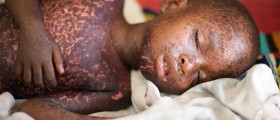
Croup is an infection small children usually contracted by inhaling infected droplets which get sneezed or coughed out in the air by children who are already infected. Is Croup Contagious?
The symptoms of croup appear 2 or 3 days after the inhalation. Alternatively, the infection can be transferred through objects infected children came in contact with. The contaminated mucus can be left on door knobs, toys, furniture and other items around the household. Nevertheless, this condition is mainly transferred through the air.
All in all, croup is a very contagious condition and one needs to be very careful in order to avoid it and to protect his/her child from it.
Signs of Croup
Basically, all symptoms of croup are triggered by narrowing of the airway. Some of the main signs of this condition are, therefore, a barking cough, a raspy, hoarse voice and a harsh, crowing noise when the affected person is breathing in. This type of cough is easy to differentiate from others. In fact, many people compare it with a bark of a seal. Moreover, sometimes, the affected children start breathing too fast and may need to sit straight in order to breathe freely once again.
Commonly, most symptoms of croup escalate during the night, improving during the day. Thus, the croup attacks may interfere with sleep and cause the affected children to wake up during the night. Fortunately, this condition starts improving in up to 5 days.
Before a child even develops croup, he/she may have difficulties breathing properly and fever higher than 103 degrees Fahrenheit.Facts about Croup
A child can develop multiple instances of croup, with many subtypes of this virus affecting him/her. Basically, RSV, parainfluenza, adenovirus and the classic flu virus, all can be the possible culprits behind croup.
Note that, once the child suffers from croup often, he/she is likely to be affected by a condition called spasmodic croup. Children with this type of croup can have breathing issues without any other symptoms, recovering from this health problem over a course of hours.Preventing Croup
Since croup is a common condition affecting children in the fall or winter, decreasing exposure to other children, especially if they are sick, can help. However, there are no medications or vaccines which can contribute to protecting your child against croup. Nevertheless, eating proper food and taking good care of personal hygiene are both steps which can help significantly.
During coughing attacks which are common for croup, stay with your child and do your best to relax him/her. Breathing steam in can help, as well as breathing the cool, night air. Finally, avoid smoking in the house and make sure that your child is well hydrated. Alternatively, you can place an air humidifier in the child's room.

















Your thoughts on this
Loading...